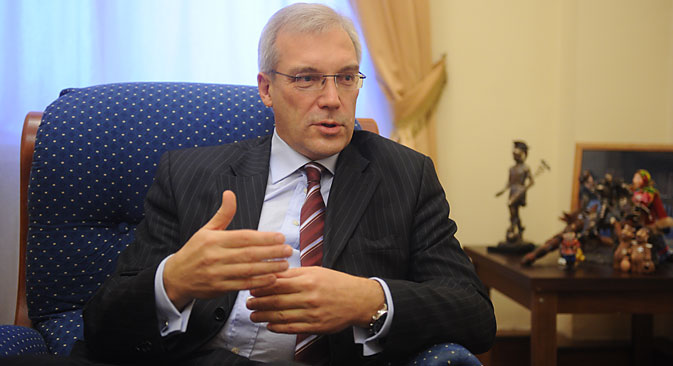
Alexander Grushko. Source: Grigoriy Sisoev / RIA Novosti
Were experts right to be optimistic about the new Secretary General?
I would neither underestimate nor overestimate the Secretary General's role. He expresses the view of all the alliance's 28 members and, putting his personal qualities aside, relies on the common denominator of the allies' position. NATO's approaches to the various global and regional security issues, including the break with Russia, had already been determined at the Wales Summit in September.
What is your evaluation of that summit?
Seeing how the summit's decisions are being put into practice, NATO intends to increase the operational readiness of its troops and move its military infrastructure closer to Russian borders. This is a direct course to an escalation of tensions and the undermining of military security in regional terms and in Europe in general…
How will Russia behave in the given situation?
NATO will understand that its new strengthened configuration of forces will be taken into consideration in Russia's military planning and that Russia will take all the necessary measures to guarantee its security in the event of any threat.
Does Moscow have any strategy for the restoration of relations with NATO? Jens Stoltenberg announced that NATO is ready to establish relations with Russia, but that Russia must first change its policy towards the situation in Ukraine.
Today it is clear for many people that "confrontational expectations" had been building up in some NATO countries for several years, but could not find an outlet. This was apparent in the hostility to Russia's increasing role in the world and the fabricated accusations of our uncooperativeness, our so-called unwillingness to cooperate in the Missile Defense System and other key security issues.
You mean relations had been souring before Ukraine?
After the conclusion of operations in Afghanistan, when NATO was faced with the prospects of not having much work, the alliance tried looking for new points of application. Long before the events in Ukraine, NATO had been developing plans to drastically intensify its military training in order to compensate for the loss of the giant, permanently active military testing grounds for the coordination of forces that the International Security Assistance Force in Afghanistan had represented. The alliance needed a significant pretext to "return to the basics," that is, to territorial defense of the Cold War period. And this pretext was found in Ukraine…
But the Russian government also did not trust NATO. Perhaps in the breakdown of relations both sides were at fault?
We did not reject dialogue with NATO. We were not the ones to decide to halt practical cooperation projects within the NATO-Russia Council. I would like to emphasize that we were cooperating with NATO not for the sake of cooperation, but with the aim of strengthening security in the entire Euro-Atlantic region. We were firmly convinced that real cooperation is possible only when it is based on equality and mutual respect.
In your opinion, what is it concretely that NATO has lost by stopping cooperation within the framework of the NATO-Russian Council?
By breaking off cooperation with Russia, the alliance weakens the potential of international efforts to combat terrorism, piracy, the proliferation of weapons of mass destruction, narcotrafficking and regional instability.
Mr. Stoltenberg announced that NATO's intention to expand its military presence in Eastern Europe does not violate its agreements with Russia. Is this true?
According to the 1997 Founding Act between NATO and Russia, the alliance undertook not to deploy additional military forces on a permanent basis in its Eastern European member states, as well as nuclear weapons and infrastructure. Today we see a substantial increase of the allies' military aviation on eastern borders, a heightened activity in the Baltic and Black Seas, military training to repel the so-called "aggression from the East," the transference of heavy military technology from the U.S. to Europe and the involvement of American strategic aviation.
But during the summit NATO said that this is not permanent deployment, but only continuous rotation. From the Russian standpoint, how are they different?
They're not. It's only a matter of juggling words, that's all. This rotational presence is supplemented by forces that will be involved in training that will take place on a permanent basis. According to Jens Stoltenberg, the alliance and its members have already organized almost 200 training exercises this year and are announcing new ones every other day. I would like to add that NATO has also made multimillion-dollar investments in the modernization of the military infrastructure of the Central and Eastern European countries.
First published in Russian at Kommersant.
All rights reserved by Rossiyskaya Gazeta.
Subscribe
to our newsletter!
Get the week's best stories straight to your inbox